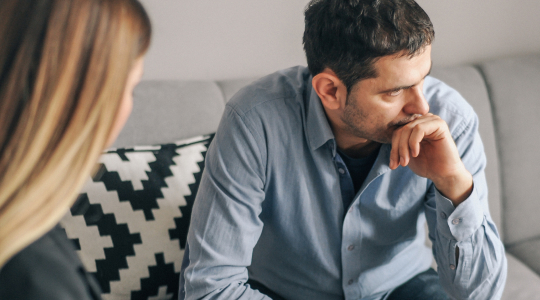Uncovering the biggest cancer myths
Myths surrounding cancer can cause unnecessary worry about your health and wellbeing. Here are the facts.
Finding trustworthy information on cancer
There’s a lot of information about cancer available, but some of it’s misleading or wrong. With a surge of people in 2024 searching for the biggest causes of cancer, it’s important to sort fact from fiction.
If you’re worried, turn to reliable sources like the Bupa website, the NHS or Cancer Research.
Dr Tim Woodman, a Medical Director at Bupa UK insurance, says: “Myths – such as whether cancer is contagious – spread misinformation and can prevent people from speaking to healthcare professionals.
“Common misconceptions can also contribute to feelings of stigma and taboo surrounding cancer.
“Recently, you may have started to pay closer attention to your health, symptoms of illness and ways to minimise your risk of getting sick. For example, avoiding those who are poorly and changing your diet to lower your chances of illness.
“I cannot stress this enough, if you’re worried about your risk of cancer or you’ve spotted any symptoms, speak to a healthcare professional.”

The biggest myths about the causes of cancer
-
Is cancer contagious?
-
Do burnt foods cause cancer?
-
Can using hair dye lead to cancer?
-
Can deodorant cause cancer?
-
Can injuries lead to cancer?
Myth one: Cancer is contagious
Searches doubled
'Can you catch cancer from someone else?’
You cannot ‘catch’ cancer from someone else. If you know someone who has cancer, there’s no need to avoid them. It’s OK for you to look after them through their diagnosis. Often, a loved one who has cancer needs your support more than ever.
Data taken between November 2023 and October 2024. Source: Based on internal Bupa analysis of Google search data.
Myth two: Burnt foods cause cancer
17 times as many
searches
'Is eating burnt food bad?'
A quick search on Google shows a variety of articles linking burnt food to cancer. When you cook foods at a high temperature, acrylamide (a chemical that’s found in starchy foods like bread and potatoes) can be found. However, there’s not enough evidence to link burnt food to an increased risk of cancer.
Some foods – including processed and red meats – can increase your risk, but this doesn’t mean you’ll get cancer. More research is needed, however red meat is classed as a probable cause of cancer. Making small changes, like opting for meat-free days or mainly having white meat like chicken or turkey, or fish, can improve your diet and lower your risk.
Fortunately, eating a balanced and varied diet can reduce your risk of developing cancer. A diet high in fresh fruit and vegetables and low in processed food is key for your health and essential for maintaining a healthy weight. Aim to eat more fibre, such as whole grains, cereals and nuts to lower your risk of bowel cancer too.
Data taken between November 2023 and October 2024. Source: Based on internal Bupa analysis of Google search data.
Myth three: Hair dye can lead to cancer
Searches doubled
'hair dye can cause cancer'
Based on the available research, personal use of hair dyes to change your hair colour or regularly dye your roots won’t cause cancer. Hair dye is unlikely to be a significant risk factor, if it is one at all. More research is needed, however there is a small amount of evidence that daily contact with hair dye may increase your risk of developing bladder cancer.
Family history, diet, smoking, and exercise have far more to do with your cancer risk. Smoking remains the biggest risk for bladder cancer. In fact, you’re three times more likely to develop bladder cancer if you smoke.
Data taken between November 2021 and October 2024. Source: Based on internal Bupa analysis of Google search data.
Myth four: Deodorant can cause cancer
Searches doubled
'Does aluminium in deodorant cause cancer '.
You may worry that certain chemicals found in personal care products, like deodorant, cause cancer. In fact, the myth that deodorant causes breast cancer has been circulated for many years.
There are strict safety regulations and laws that control ingredients in makeup and toiletries, so rest-assured that antiperspirants, body sprays and deodorants do not cause cancer. There is very little scientific evidence to suggest they do.
So what does increase your risk of developing breast cancer? Your chances increase with age, so make sure you’re regularly checking your breasts and you’re aware of any changes. This may help you spot early signs and symptoms of breast cancer.
Being overweight, drinking more than the recommended amount, and having a family history of breast cancer increases your risk too.
Data taken between November 2021 and October 2024. Source: Based on internal Bupa analysis of Google search data.
Myth five: Injuries can lead to cancer
Searches quadrupled
'Cancer bruise on breast'
Another common myth is that an injury can cause cancer. Stories about potential causes like this one are often in the media and it isn’t always clear which ideas are supported by evidence.
Injuries may sometimes lead to someone finding a cancer near to the injured area that was already there, but they won’t be the leading cause. There’s no evidence that an injury will cause cancer. Sometimes an injury can cause a lump, but again, this won’t lead to a cancer diagnosis.
Data taken between November 2021 to October 2024. Source: Based on internal Bupa analysis of Google search data.
Cancer symptoms you should never ignore
If you notice any changes or anything unusual, it’s always a good idea to get them checked out as they could be linked to cancer.
The sooner you have a diagnosis, the quicker suitable treatment can start if it is cancer, improving your chances of making a full recovery.
- Breast lumps and changes to your breasts
- Changes to your bowels and toilet habits
- Persistent cough
- Problems passing urine
- Changes to an existing mole
- Vaginal bleeding after sex, between periods or after the menopause
The best way to look after your health is to know your body and what’s normal for you. Always flag anything new or unusual that doesn’t go away within three or four weeks to your GP.

What can I do to lower my risk of cancer?
Lead a healthy lifestyle
Studies have shown that if you do 30 minutes of moderate, heart rate raising activity every day, you can significantly reduce the risk of several major cancers. That includes breast, bowel and womb cancer.
Exercise is also helpful if you’ve been diagnosed with cancer – both during and after treatment.
A balanced diet full of fresh fruit and vegetables, wholegrains, and healthy sources of protein (white meats, fishes and pulses) will help you maintain a healthy weight, and ultimately lower your risk of cancer.
Drink sensibly
Over the long term, drinking alcohol can increase your risk of serious illnesses, such as mouth, throat and breast cancer. Drinking guidelines can be hard to follow, but try to drink in moderation and have some alcohol-free days each week.
A new concept that has captured the attention of people looking for a healthier relationship with alcohol is ‘mindful drinking’. Being aware of why you’re drinking and how much you’re having, often leads to healthier relationship with alcohol and less consumption.
Stop smoking
Tobacco smoke contains lots of chemicals and toxic gases, known to be harmful to your health, and for increasing your risk of lung cancer.
Stopping smoking can be more effective if you choose your quit method and then establish a social support network to help you. If you need help quitting, options like nicotine replacement or a support groups to help with the psychological addiction, could be for you.
Attend your screenings
Health checks and cancer screenings across all ages are there to detect any early signs of abnormalities and cancer. It’s important to attend these and know how to identify changes in your own body.
Attending all appointments, even if you’re feeling well, is vital. An abnormality could be found before you start showing any symptoms. Early detection is key to effectively treating cancers.
Cancer advice and support
Bowel cancer awareness
Your risk of bowel cancer increases with age and is also affected by your family history and lifestyle, such as if you smoke.
Breast cancer awareness
Knowing how your breasts look and feel can help you recognise any changes and identify cancer early.
Prostate cancer awareness
Prostate cancer is an abnormal and uncontrolled growth of cells found in your prostate gland. It’s the most common cancer in men in the UK.


